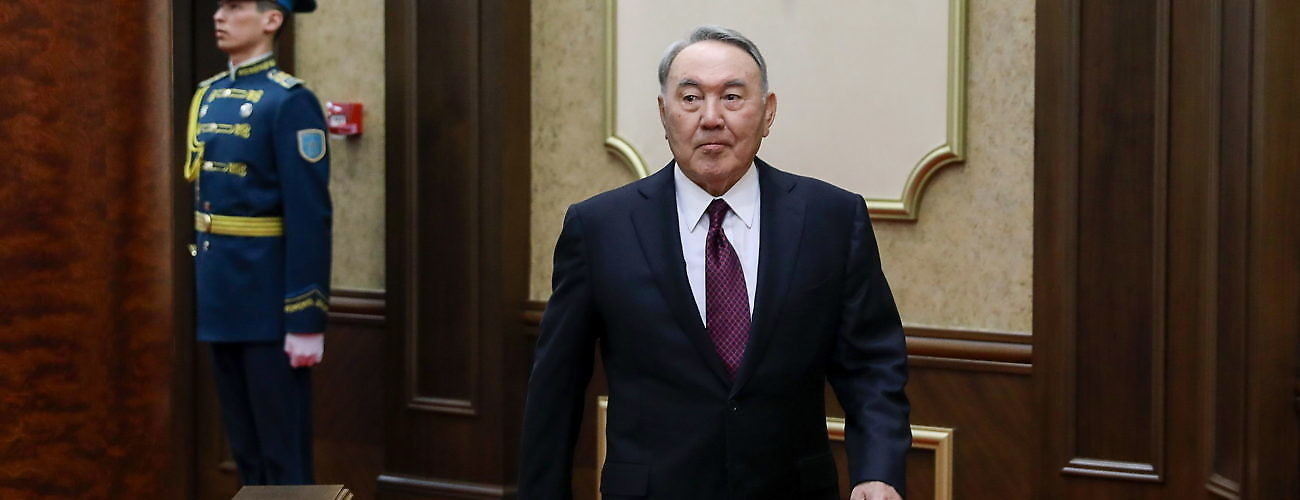Kazakhstan's ex-president Nursultan Nazarbayev before an inauguration ceremony for interim president Kassym-Jomart Tokayev at a meeting of Kazakhstan's parliament. (Pavel Aleksandrov\TASS via Getty Images)
Kazakhstan’s perennial leader since 1989, Nursultan Nazarbayev, resigned on March 19, 2019. His retirement shocked international commentators and was widely interpreted as a surprise development, marking a new era not just for this former Soviet Republic but the whole Central Asian region.
But the abruptness and its far-reaching repercussions may be overstated. Nazarbayev’s resignation should be seen as a long-term and carefully planned strategy to keep his political legacy intact, safeguarding it against radical alteration while transitioning power to the governing elite’s younger members.
All other Central Asian states have experienced disruptive regime change following either the natural death of a long-serving leader (Turkmenistan in 2006 and Uzbekistan in 2016) or outbreaks of civil unrest (Tajikistan in 1992 and Kyrgyzstan in 2005 and 2010). Nazarbayev chose the Deng Xiaoping variant of transitioning out, distancing himself from current affairs while retaining sufficient authority to block executive decisions that counter his will.
Preparations commenced as far back as 2010 when Nazarbayev received the title of Elbasy (Leader of the Nation), giving him the lifelong right to oblige all state bodies and officials to consider any initiatives he presents. He also obtained comprehensive legal immunity for himself, his family, and their property.
The 2017 constitutional reform transferred many presidential powers to the parliament and cabinet, limiting the executive prerogative of the next head of state. In 2018, Nazarbayev was also confirmed as the head of the nation’s Security Council for life. The Council itself was turned into a constitutional body responsible for the oversight of the national interests of Kazakhstan—a broad portfolio.
Having set scaffolding for a senior statesman role, the 78 year-old first president stepped down. The timing was propitious: Kazakhstan had recovered from one of the most difficult periods in its history between 2015 and 2017, characterized by an economic slowdown, popular protests, and an upsurge in terrorist acts. Following constitutional procedure, long-term loyalist Kassym-Jomart Tokayev stepped down from his post as Senate chairman to become Interim Head of State.
Tokayev could have stayed on as an unelected president until April 2020, serving the remainder of Nazarbayev’s term, but on April 9 he called an early presidential poll for June. In a televised address, Tokayev stressed that he had consulted with Nazarbayev and added that the vote would be a referendum on ‘the continuity, predictability and stability of our domestic and foreign policy’ and “strategic course of the Elbasy.”
Despite Tokayev’s promise of “fair and transparent” elections, odds are overwhelmingly stacked in favor of a ruling Nur Otan party candidate, whose chairman is none other than Nazarbayev. Nominations close on April 28 and must be made by political parties and public associations with no possibility of running as an independent. Six of the opposition parties are anemic and will struggle to match the Nur Otan behemoth on the campaign trail. One of them, the Azat Party, has not shown any life over the past 18 months, according to Kazakhstan’s Central Electoral Commission.
The elections’ only intrigue is over Nur Otan’s nominee, provided at the party’s April 23 congress. It is highly likely that Tokayev will be selected although commentators have suggested other possibilities. These include Nazarbayev’s daughter Dariga, who replaced Tokayev at the Senate, and nephew Samat Abish, Deputy Director of the National Security Committee, Kazakhstan’s security and intelligence service. But Nazarbayev himself has repeatedly said that power will not be family business in Kazakhstan.
Besides, Tokayev has greater political experience and public appeal than all other potential candidates. The Elbasy, introducing Tokayev as a successor on March 19, referred to him as “an honest, responsible, and indispensable person” to whom “we can entrust the governance of Kazakhstan.” It would look odd should this trust evaporate within a month. The snap poll and a very short lead-in period serves to legitimize Tokayev’s leadership and deny elite factions an opportunity to challenge him.
One of Tokayev’s key assets is that he is not connected to the competing financial–industrial groups and has not been implicated in corruption scandals affecting prominent politicians, including Nazarbayev’s entourage. A skilled technocrat and consummate diplomat, he is well positioned to preserve and advance the Elbasy’s strategic vision.
Tokayev’s first steps as president have demonstrated not just his commitment to continuity but also a nuanced approach to the practicalities of maintaining stability. Commenting on the hot-button issue of moving Kazakh onto Latin script, he confirmed that the transition would proceed as ordained by the Elbasy. But he added that public opinion would be taken into account in its implementation to minimize inconvenience to those accustomed to Cyrillic script.
Taking cue from Nazarbayev’s criticism of the government not doing enough on social welfare, Tokayev also toured two of the poorest regions, announcing modest wage increases for state employees, 40,000 cheap rental flats and two programs of rural infrastructure development. Part of the financing is drawn from savings made through cutting government spending on vanity projects and image-making events.
Tokayev’s inaugural official visit abroad was to Moscow. He confirmed Kazakhstan’s commitment to multi-vector diplomacy but highlighted Russia’s special role as its most important strategic ally, vowing to maintain the “golden era” of bilateral relations inherited from Nazarbayev. He also listed deeper engagement with the Eurasian Economic Union, the European Union, China’s Belt and Road Initiative, and Central Asian neighbors as other top foreign policy priorities.
Those expecting to see significant change in the wake of Nazarbayev’s semi-departure might be disappointed: it will be business as usual under Tokayev or whoever is elected president in June 2019. Kazakhstan is not transitioning into a post-Nazarbayev era yet, merely moving into a leaner and perhaps more user-friendly version.
Kirill Nourzhanov is a Senior Lecturer at the Centre for Arab and Islamic Studies (CAIS), The Australian National University. This article was originally published in East Asia Forum.





